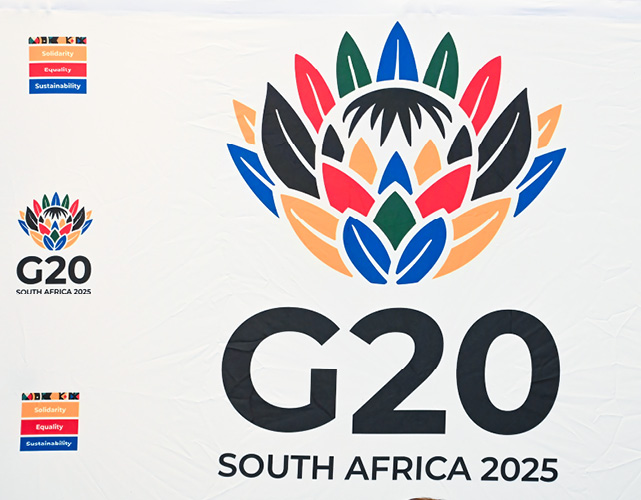With South Africa having assumed the G20 Presidency five months ago, the PIC has been playing an instrumental part in ensuring that this role’s objectives are realised, writes Abel Sithole
South Africa’s assumption of the Group of Twenty (G20) Presidency in December 2024 marked a historic moment for the country and the entire African continent. For the Public Investment Corporation (PIC), one of Africa’s largest asset managers with over R3 trillion in assets under management, this leadership role presents far more than a ceremonial significance. It presents a strategic opportunity to steer the global financial architecture and advocate for the needs of marginalised communities while accelerating sustainable and inclusive development across the African continent and the world.
Strategic Convergence is a Necessity in Aligning Global Priorities with Local Impact
The G20, representing 19 of the world’s largest economies, plus the European Union (EU) and the African Union (AU), promotes global economic and financial stability, fosters collaboration, and works to find solutions to global challenges, setting the tone for global economic and social policy and investments.
For the PIC, South Africa’s G20 Presidency provides a platform to advocate for responsible investment, particularly in emerging markets, in line with its solidarity, equality, and sustainability themes. The G20 Forum during South Africa’s G20 Presidency will promote the realisation of the global Sustainable Development Goals (SDGs) through the continued incorporation of environmental, social, and governance (ESG) principles in global investments, ensuring that capital flows are directed toward projects that contribute to a more equitable and sustainable future.
The PIC is contributing to the work of the G20 Finance Track led by the National Treasury and the South African Reserve Bank, which includes:
- The International Financial Architecture: reinforcing multilateral development banks, enhancing debt sustainability, strengthening the global financial safety net, and strengthening financial resilience through robust capital flows;
- Infrastructure: developing an investable infrastructure pipeline, scaling up sustainable infrastructure through blended finance approaches, and delivering cross-border infrastructure for regional development;
- Sustainable Finance: strengthening the global sustainable finance architecture, scaling up financing for adaptation and a just transition, and unlocking the financing potential of carbon markets; and
- Global Partnership for Financial Inclusion: developing financial products and services, particularly among women, youth, and small, medium, and micro enterprises.
Through the G20, the PIC advocates for increased investment in sustainable infrastructure projects, fostering partnerships between international investors, development finance institutions, and African governments.
The G20’s focus areas, from climate finance and infrastructure investment to financial stability and multilateral development bank (MDB) reform, mirror the country’s strategic and the PIC’s priorities.
This convergence creates unprecedented opportunities. The G20 Sustainable Finance Roadmap, for instance, provides exactly the kind of framework the PIC needs to scale up its R50 billion commitment to renewable energy projects, including its ongoing investments in solar and wind initiatives through South Africa’s Renewable Energy Independent Power Producer Procurement Programme (REIPPPP). Such alignment demonstrates that our investment decisions can simultaneously generate returns for pensioners and workers whilst advancing both the national and global sustainability objectives.
Unlocking Africa’s infrastructure potential
Infrastructure development remains the backbone of the PIC investment strategy, with more than R150 billion already allocated to transformative projects in energy, transport, and digital connectivity. The G20’s emphasis on blended finance mechanisms and private-sector co-investments is timely for the country and the continent’s development needs.
South Africa’s experience with projects like the Gautrain Rapid Rail Link demonstrates how institutional investment can catalyse large-scale infrastructure development. Through South Africa’s G20 Presidency, South Africa, and the PIC are positioned to replicate and scale such successes by leveraging global partnerships that reduce financing costs and dramatically shorten project lead times.
The G20’s current focus on reforming multilateral development banks (MDBs) is particularly crucial for Africa. By advocating for more accessible concessional funding and improved risk-sharing mechanisms, we can help address the continent’s infrastructure deficit with unprecedented speed and efficiency. The potential impact is staggering, given that the African Development Bank estimates Africa’s infrastructure financing gap at over $100 billion annually. This is, however, a shortfall that the country is now better positioned than ever to help address.
Leading the Environmental, Social, and Governance (ESG) Revolution in Emerging Markets
The PIC has long been at the forefront of environmental, social, and governance (ESG) investing in emerging markets. The G20’s current push for standardised sustainability reporting frameworks, including the adoption of the Taskforce on Nature-related Financial Disclosures (TNFD), validates and reinforces its approach.
The country’s Green Bond Programme exemplifies this leadership, channelling capital into projects that simultaneously address climate resilience and social equity. With global sustainable finance assets projected to exceed $50 trillion by 2025, the PIC’s alignment with G20-endorsed standards ensures that it remains the partner of choice for international investors seeking ESG-compliant opportunities in high-growth markets.
This leadership extends beyond financial metrics. The PIC’s investments in sustainable agriculture, affordable housing, and healthcare infrastructure demonstrate how institutional capital can drive measurable social impact while delivering competitive returns, which is precisely the model the G20 seeks to promote globally.
A Defining Moment for South Africa and the Continent
South Africa’s G20 Presidency represents a once-in-a-generation opportunity to reshape both the national economic trajectory and Africa’s position in the global financial system. For the PIC, however, the G20 Presidency offers numerous opportunities to demonstrate how institutional investors can be powerful catalysts for inclusive and sustainable growth.
The potential outcomes are transformative: scaled infrastructure investment through innovative financing models, deeper ESG integration that meets global benchmarks, strengthened partnerships with MDBs to reduce Africa’s cost of capital, and enhanced foreign direct investment (FDI) flows into priority sectors.
With South Africa having assumed the G20 Presidency five months ago, the PIC has been playing an instrumental part in ensuring that this role’s objectives are realised. The G20 Presidency isn’t just about South Africa taking its rightful place on the world stage; it is about using that platform to deliver tangible benefits for the country, the continent, and the world.
Abel Sithole is the CEO of the Public Investment Corporation (PIC).

